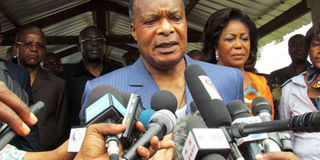Nguesso seeks to extend 32-year reign

Congolese President Denis Sassou Nguesso talks to the media after voting on October 25, 2015 in Brazzaville. He will be seeking a third term in Sunday’s election. PHOTO | AFP
What you need to know:
- Sassou Nguesso has come under pressure in former colonial power France about his lavish lifestyle, with rights groups pressing for investigations into his acquisition of luxury homes and expensive cars.
- A lawyer for anti-corruption watchdog Transparency International, William Bourdon, says Sassou Nguesso embodies “a caricature of kleptocracy, of a rich head of state who leads a poor country.”
- After some time in exile in Paris the former paratrooper colonel returned to Congo in 1997 and seized power in an armed uprising ending the central African country’s civil war.
BRAZZAVILLE, Friday
Republic of Congo’s President Denis Sassou Nguesso, seeking a third term in Sunday’s election, began his political career as a Marxist-Leninist and has become a wealthy strongman determined to extend his 32 years in power.
One of Africa’s five longest-serving leaders, having first taken office in 1979, he used the army as a springboard to power, while amassing a fortune.
Sassou Nguesso has come under pressure in former colonial power France about his lavish lifestyle, with rights groups pressing for investigations into his acquisition of luxury homes and expensive cars.
French judges are investigating the supposedly vast ill-gotten gains of the leader and his extended family despite him warning them in 2013 to lay off “domestic affairs”.
A lawyer for anti-corruption watchdog Transparency International, William Bourdon, says Sassou Nguesso embodies “a caricature of kleptocracy, of a rich head of state who leads a poor country.”
But asked in April 2013 whether he was losing sleep over the issue, Sassou Nguesso replied with a jovial “Certainly not!”
An imposing 72-year-old with close cropped hair, clad in tailored suits enhancing his confident air, Sassou Nguesso’s first 13-year stint as president ended in 1992 when, then a Marxist-oriented leader, he was voted out of office.
After some time in exile in Paris the former paratrooper colonel returned to Congo in 1997 and seized power in an armed uprising ending the central African country’s civil war.
Five years later he became president for the second time, succeeding Pascal Lissouba in disputed 2002 elections.
OPPONENTS BOYCOTTED POLLS
In the country’s last presidential election in 2009, he won nearly 79 per cent of the vote, with half of his 12 opponents boycotting the polls.
Now he is vying for a third mandate after a controversial referendum in November approved a new constitution.
He has ruled over the poor nation of 4.5 million people by facing down challenges from rebels and accusations of corruption and mismanagement of resources, especially in the state-run oil sector upon which Congo heavily depends.
Sassou Nguesso, an ethnic Mboshi, was born in 1943 in Edou, a town 400 kilometres north of Brazzaville.
He had the affectionate nickname of “Otchouembe”, which means “palm nut” in his local language and is commonly used to describe a wrestler with muscles as hard as ebony.
From the age of 13 he trained to become a teacher, before enrolling in an Algerian military academy in 1961, followed by another in Saint-Maixent, France, two years later.
Back in Congo, Sassou Nguesso supported a 1968 movement that toppled president Alphonse Massemba-Debat and brought Marien Ngouabi to power.
Named head of a commando unit and then defence minister, Sassou Nguesso became the regime’s ideological head and co-founded the Marxist-leaning Congolese Labour Party in 1969.
In 1979, two years after Ngouabi was assassinated, Sassou Nguesso became head of state.
He was forced to introduce multi-party elections in 1991 and was defeated by Lissouba in a presidential poll a year later.
The decade that followed was wracked with civil war, from which Sassou Nguesso ultimately emerged victorious in 1997.
Back in power he organised a presidential election in 2002, which he officially won with a score of almost 90 per cent.





